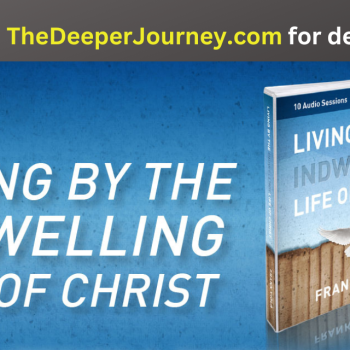“Truly you are a God who hides himself, O God and Savior of Israel.” ~ Isaiah 45:15
The question of God’s existence has plagued philosophers and theologians for thousands of years. For that reason, I don’t have any canned answers on the question and I’m not about to solve the problem. But I do have some thoughts that may cause you to rethink your position and help you reach your own conclusions.
In a recent (and very controversial post) entitled There is No Proof of God’s Existence, I pointed out that the existence of God cannot be proven. That, however, doesn’t mean that God doesn’t exist. I believe He set the deck intentionally that He cannot be verified by empirical means. But God has provided clues in the universe — evidences — that confirm His existence to the believing.
That said, I have met many people that have struggled with believing in the reality of God. This is especially true for very intellectual people. They feel that there is zero proof for God’s existence. How can a person put faith in a God who cannot be seen, felt, heard, touched, or smelled with his or her physical senses?
Some people deny God’s existence because they love their lifestyle. They surmise that if there were a God, they would have to be accountable to Him and change their behavior. As a result, they simply reject the notion that God exists so they would not have to feel accountable to anyone for their actions. For them, to believe that there is no God helps to appease their conscience in some way.
Others have experienced deep pain, sorrow and heartbreak in their lives. And many of them cannot understand why a good God would allow such things. A legitimate question and struggle, without doubt.
Even for the most devoted Christians, when tragedy strikes, faith is put into the salt-shaker.
No one can prove that God exists. Only evidences can be offered. I learned that early on.
When I first started down the path of being a Christian, I took a big interest in trying to convince my friends that God was real. Sometimes we would evaporate hours discussing the subject.
Enduring their antagonistic bombasts caused me to generate my own nagging doubts. It had gotten so bad that my path grew almost too dim to follow. But after processing the whole subject to near exhaustion, I discovered that I couldn’t deny that God exists, even if I tried.
Faith was present. And I couldn’t shake it.
There are a few things to consider before you adopt the idea that no evidence exists for God’s existence. I will state one of them in this post. Please share it with your friends . . . including agnostics and atheists. I would like to ask them to show me where I’m wrong . . . as I certainly can be. None of us can claim immaculate perception.
The complexity, order, sophistication, and intricate design of the universe and all biological and botanical life give strong evidence for God’s existence.
There are only three alternatives to explain the origin of the universe: 1) It always existed, 2) It was created by chance, or 3) It was created by God.
The universe could not have always existed, for it is expanding and contracting. This suggests that it came into existence at a certain point in time.
The universe could not have been created by chance because it is too orderly and complex. It is a basic principle that the things which chance creates are always unorganized, irregular, inconsistent, and partially integrated. And whatever chance creates, it almost instantaneously destroys.
For example, if I continue to throw a chair into the air, by chance the chair will eventually fall to the ground on its four legs. However, the next time I throw it up, it will land on its back or side.
Suppose that we put a monkey in front of a computer keyboard. If the monkey stays at that keyboard long enough, he may eventually produce a coherent sentence (maybe after a few hundred years of typing!). The sentence may be: “Monkeys rule.”
However, with the next few strokes, the monkey will make that coherent sentence incoherent through his arbitrary typing: “Monkeys rule lsldksldfsdoaf.”
So whatever chance creates, it almost instantaneously destroys. Therefore, it is inconceivable to believe that chance could create anything complex and sophisticated, whether it be a watch, a car, a computer, or a human being. All of these things require a superior designer.
Therefore, the consistency, organization, symmetry, form, and purposefulness of the universe and all life forms testify compellingly to God’s existence. Would you not agree?
I mean, can you conceive of something as complex as the human brain simply coming into existence randomly by the forces of chance? That would be like believing that the computer I’m presently typing on just appeared without a designer.
Can you conceive that something as complex as human life emerged spontaneously out of nothing but random chance and long periods of time?
By my lights, it requires much more faith to believe that the universe always existed or that it was created by chance than to believe that God created it.
Incidentally, the “Big Bang” theory doesn’t solve much. For it doesn’t answer the probing question: “Who or what started the Bang in the first place?”
Augustine said, “Do not seek to understand that you may believe, but believe that you may understand.”
Faith is simply trust. It is rooted in humility and is the tool of a child. It knows with the heart, not the mind. Though it doesn’t contradict reason.
Surprisingly, the Bible never sets out to prove God’s existence. The Lord has chosen to remain invisible. He is a God who hides Himself (Isaiah 45:15). He has chosen to remain unprovable.
One reason for this is because salvation is a work that is utterly His own. It is exclusively His doing. No person could ever boast about being saved because they were bright enough to figure out that God exists. Knowing Him is a matter of child-like faith that springs from humility, and it will always be so.
“The Lord resists the proud, but gives grace to the humble” and “The fool says in his heart, ‘There is no God,’” we are told in the Bible.
God reveals Himself to those with believing, child-like hearts.
While on earth, Jesus said, “I have hid these things from the wise and prudent, but revealed them unto babes.”
So be a child. Be a babe. For the kingdom of God is given to such.
So it seems to me anyway.













